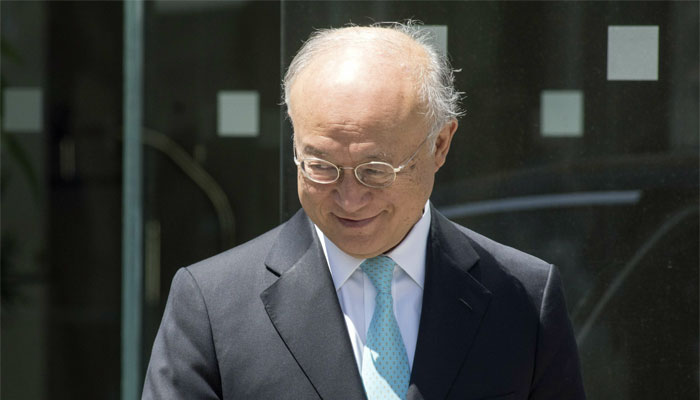International Atomic Energy Agency director general Yukiya Amano leaves the Palais Coburg Hotel, venue of the Iran nuclear talks meetings, in Vienna. AFP
AFP/ Vienna
Global powers and Iran hit the final straights of marathon talks Saturday, amid signs some of the toughest hurdles blocking a deal to curb the Iranian nuclear programme may been resolved.
After a 13-year standoff which has poisoned Iran's international relations, the UN atomic watchdog voiced hopes of a breakthrough to complete a stalled probe into whether Tehran sought to develop nuclear arms in the past.
And on complicated moves to ease a web of sanctions, there were indications that at least at the level of experts some understanding may have been thrashed out, although discussions continued as a new Tuesday deadline looms.
The so-called P5+1 -- Britain, China, France, Germany, Russia and the United States -- are trying to draw the curtain on almost two years of roller-coaster negotiations, which gathered fresh impetus after President Hassan Rouhani took power in late 2013.
The aim is to finalise a deal which would put a nuclear bomb beyond Iran's reach, in return for lifting biting international sanctions slapped on the Islamic republic, some of which date back to 1995.
IAEA chief Yukiya Amano told reporters after a whirlwind visit to Tehran that progress had been made as the International Atomic Energy Agency (IAEA) seeks to ensure that any deal is "technically sound."
"With the cooperation from Iran, I think we can issue a report by the end of the year on the ... clarification of the issues related to possible military dimensions," Amano told reporters after his talks in Tehran earlier this week.
Iran has long denied it has sought to develop a nuclear bomb and has so far refused UN inspectors access to sensitive military sites to verify its claims.
The standoff has stalled an IAEA probe into the allegations that before 2003, and possibly since, Iran conducted research work into developing nuclear weapons.
US Energy Secretary Ernest Moniz and Iran's nuclear chief, Ali Akbar Salehi, were back at the negotiating table early Saturday seeking to finalise the deal.
Meanwhile, it also seemed there had been some agreement at expert level on how to ease a web of UN, EU, and US sanctions.
A Western official told AFP that a deal "was possible" on the US sanctions "but there is no agreement yet on the UN" embargoes.
"There are still differences which are being discussed," an Iranian official insisted.
And a senior US administration official said: "Even if and when issues get resolved at an experts' level, there will remain some open issues that can only be decided by ministers."
Ministers returning
As hopes grew for a deal, French Foreign Minister Laurent Fabius, and Germany's Frank-Walter Steinmeier were expected back in Vienna on Sunday. It was not immediately clear if EU foreign policy chief Federica Mogherini would also return.
Iranian Foreign Minister Mohammad Javad Zarif, who was to hold a second meeting later Saturday with US Secretary of State John Kerry, said the world had "never been closer" to reaching a ground-breaking deal.
In a rare move, he also offered the promise of greater cooperation to tackle other global problems, such as the rise of the Islamic State group, should the deal be sealed.
Iran was ready to strike "a balanced and good deal," Zarif said in an English message posted on YouTube, which could "open new horizons to address important common challenges".
"Our common threat today is the growing menace of violent extremism and outright barbarism," he said in a clear reference to the Islamic State (IS) jihadist group that has overrun parts of Syria and Iraq.
Russian diplomats have said the complex accord, which will stretch to at least 20 pages with a slew of technical annexes, is "90%" written.
After missing several deadlines, the so-called P5+1 group has now given themselves until Tuesday to conclude the deal.

